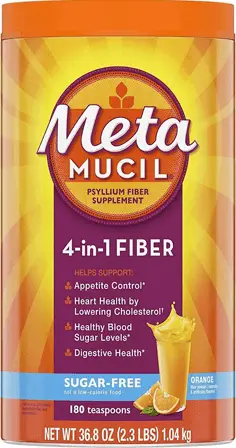Metamucil for Dogs | Is it Safe
12.12.2021.
Humans and dogs have many similar health complications, and one of them is constipation. There are different products and supplements we can take to help us deal with this uncomfortable issue. One of the most popular ones is Metamucil. Naturally, many dog owners start to wonder if that might be a safe option for their dogs. Nobody likes to see their beloved pets struggling, especially with constipation. If you wondered the same thing, here are a few things you should know about Metamucil for dogs.
What is Metamucil?
Metamucil is a brand. It is a product produced by Procter&Gamble, a company that produces Pampers diapers, Old Spice, and different consumer products. Metamucil is a psyllium-based product humans use as a bulk-forming laxative. Its main job is to get your digestion back on track. We can’t talk about Metamucil without talking about psyllium.
What is psyllium?
The easiest way to define psyllium is - its fiber. More precisely, it is a soluble fiber, which means it will pass through the digestion system without being absorbed or broken down. If you’re a dog owner, you should be aware of fiber’s positive effects on your dog’s digestion. However, many of us weren’t aware of fiber’s benefits until our vets or other dog owners didn’t recommend it.
Psyllium is a great fiber supplement that will absorb excess moisture and fluids in your dog’s digestive system. That is its primary way of getting things “back on track.” If your vet approves it, Metamucil should help your dog get rid of constipation.
Do you know which fiber sources are safe for dogs? Check out this article - Best fiber sources for dogs.
VET TIP: There are different human medications and supplements that are safe for dogs to take. However, before you decide to give any to your dog, you should consult your vet first. There are cases where individual dogs should not take a specific supplement because of their health, dietary restrictions, or previous diseases. Make sure you talk to your vet before you decide to give human supplements to your dog.

How can Metamucil help my dog?
One of the first questions vets get about this supplement is, “How can it help my dog?” It wouldn’t make much sense to give your dog any supplement that can’t do anything for them. The good news is that Metamucil can help your dog with several issues. Here are some of the main reasons owners give their dogs Metamucil;
Constipation
The most common reason dog owners or vets give dogs Metammucil is for constipation. Since it is used as a bulk-forming laxative, Metamucil will bind itself to partially digested food. It will increase the stool’s size, texture, and moisture, which is vital for your dog’s overall health.
Diarrhea
One of the best things about fiber, like the one found in Metamucil, is that it can treat constipation and diarrhea. The same goes for dogs and humans. Scientists and vets are not entirely sure how that’s possible, but that doesn’t change the fact that it is still true. This product will absorb excess fluids and add bulk to the dog’s watery stool. It will slow digestion down and deal with diarrhea. However, the dosage should be different for dealing with constipation or diarrhea. Talk to your vet about the correct dosage.
Prebiotics
This potential benefit still has to be confirmed. However, since this product is not meant for dogs, we doubt such research will ever be conducted. Plus, it would be costly to prove the effects a human supplement has on dogs. Nevertheless, studies show that some Metamucil fibers can be fermented by the bacteria in the dog’s intestines. That will cause the formation of short-chain fatty acids, which are beneficial for a dog’s overall health. That is exactly what prebiotics can do for you or your dog.
There are other benefits manufacturers and sellers claim Metamucil for dogs has to offer, but these benefits are unconfirmed. For example, they claim Metamucil will lower cholesterol, lower blood sugar levels, and help with weight loss. You shouldn’t take these benefits for granted since they weren’t proven in humans nor dogs.
Is Metamucil safe for dogs?
Perhaps the most important question you should ask your vet before introducing anything new to your dog’s diet is, “Is it safe for my dog?” You don’t want to give your dog a supplement that will help them with one thing but create problems in a different area. The good news is that Metamucil is considered safe for dogs. However, you need to follow your vet’s instructions on dosage and frequency.
Are there side effects of Metamucil for dogs?
If you are careful about giving your dog this supplement, and the dog has access to water, there shouldn’t be any side effects you should worry about. They are incredibly rare and mild. However, if the dog doesn’t have access to water, the high fiber content in their digestive tract can become very hard and cause obstructions and severe constipation. Make sure your dog can easily access drinking water if they’re taking this supplement.
You should know one thing about Metamucil for dogs and prepare for it - Dogs that take this supplement can become gassy. If you ever had the “pleasure” of being close to your dog while they pass gas, you know how potent their flatulence can be. Keep in mind that they will produce more gas until their digestion gets sorted out.
What is the safe dosage of Metamucil for dogs?
The exact dosage and administration frequency will depend on several things. Those things are your dog’s size, age, health, and the problem that requires Metamucil. Generally, small breeds, like the French Bulldog, can take ½ teaspoon with every meal (usually twice a day). Medium-sized dogs, like the Border Collie, can take 1 teaspoon, and large breeds, like the Great Dane, can take 2 teaspoons with every meal (again, usually twice a day).
We would once again like to say that you should not give this supplement to your dog without consulting your vet. There can be particular circumstances that will require more or less Metamucil for your dog. Your vet knows your dog’s medical history. They can give you the best possible advice regarding your dog and this supplement.
World Dog Finder team







Share